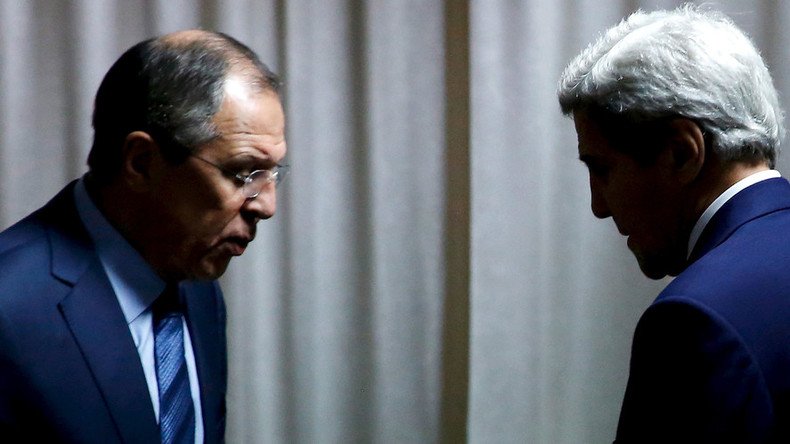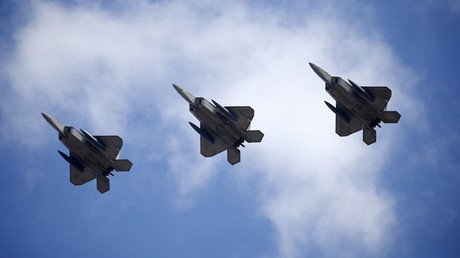‘Syria conflict reveals emergence of Russia & China as counterweights to US hegemony’

Russia’s vital interests are at stake in Syria, and few sane people want to see a terrorist government come to power in Damascus. RT discussed the risks of thwarting such a dire possibility and the possible progression of events in Syria.
The Russian Defense Ministry has vowed to use military force to thwart any efforts to inflict damage on the Syrian Army. The warning comes on the heels of media claims that the US government is considering direct airstrikes against forces loyal to the Syrian leader.
As recently as last month, the two powers were hailing a new era in cooperation after reaching a ceasefire agreement for Syria.
Now, Washington says it won't rule out imposing "costs" on Moscow and Damascus over the crisis in the country.
Moscow doesn't want a terrorist takeover in Syria
Former US diplomat Jim Jatras commented on the costs the White House is ready to “impose on Russia” over Syria:
“There are couple of things that could be done: giving more advanced anti-aircraft weapons to the opposition forces, really the terrorist groups; airstrikes against Syrian army positions, which run the risk of killing some Russians. There has been talk of even moving some ground force into northern Syria."
Jatras emphasized, however, the main dangers that such a strategy poses: Confrontation between the two main powers in the Syrian theater.
There are all sorts of possibilities, but they all have the same common denominator: they run the risk of a direct confrontation between Russian and American personnel, getting Russians and Americans killed, what Moscow and Washington managed to avoid during the Cold War but which many in Washington treat as a kind of a cavalier thing to risk. For what purpose? To save Al-Qaeda and its allies in East Aleppo. That is an incredible thing to me.”
Jatras says many people may be underestimating the present dangers, believing that dealing with Russia is the same as "Serbia or Iraq or a country like Libya, and all we have to do is make a show of strength, talk tough, threaten to kill some Russians and Moscow will back down."
"Maybe they will, because I don’t Moscow wants to risk a third world war. But the way I see it, Russia’s vital interests are at stake in Syria. They do not want a terrorist government to take over in Damascus,” he added.
READ MORE: ‘No evidence John Kerry is interested in peace in Syria’ – Virginia senator
West's main objective in Syria: Overthrow Assad
Asked whether the Pentagon is deliberately looking for a confrontation with Russia in Syria while considering air strikes against government targets, writer John Wight said that “it seems very much the case.”
“The recent airstrike carried out by the US air forces against Syrian army positions in Deir ez-Zor, which saw dozens of Syrian soldiers killed and over a hundred injured, was not an accident," Wight observed. "We know that now given Washington’s stance and given its position now and the threats that have been leveled against Russia over its stance and its refusal to give up essentially President Assad."
Arguing that the primary objective of the Americans in Syria is to see "the overthrow of the Assad government", Wight said the Syrian conflict "is more than some of its parts."
One of the most important developments in Syria "is the emergence of Russia and China as geopolitical counterweights to Washington for the first time since the demise of the Soviet Union," he emphasized.
Washington’s efforts to maintain its unipolarity, "has been a disaster for the people of Iraq, Libya and Syria (…)”, Wight told RT.
Washington should intervene less, use diplomacy more - Col. Peter Mansoor, exec. officer to Gen. Petreaus in #Iraqhttps://t.co/d1yGSg0mRt
— SophieCo (@SophieCo_RT) October 7, 2016
Obama's last stand?
Gregory R. Copley, editor of Defense & Foreign Affairs said "we have to think of this as not as a Pentagon-initiated effort but rather a White House-initiated effort."
"We have to bear in mind that this is the last opportunity for President Obama to do what he has long wanted to do with support of Saudi Arabia and Qatar which is to get the US directly involved militarily in overthrowing the Assad government in Damascus," Copley observed.
Copley then commented on what he says was "a false flag attempt in Gupta in August 2013 to create a so-called ‘crossing of the red line’ by detonating a fake sarin gas weapon in the Damascus suburbs to get the US involved, and that failed."
At that stage, it looked as if the US military and Washington had arrived at the consensus that it had no vital interests at stake in Syria to risk full-blown conflict, Copley said. But that changed with new leadership in the Pentagon.
But now, we’ve got a new Defense Secretary, we’ve got the White House pushing this as a last chance for Obama to achieve what he wanted to achieve for a long time (…)", he added.
"I think the Russian Defense Ministry’s words of caution were taken very well, and I believe what the Russian government should now do is send that message to all coalition partners to avoid any misunderstanding so they don’t get involved in airstrikes anywhere near Syrian military activities (…)", Copley told RT.
The statements, views and opinions expressed in this column are solely those of the author and do not necessarily represent those of RT.













